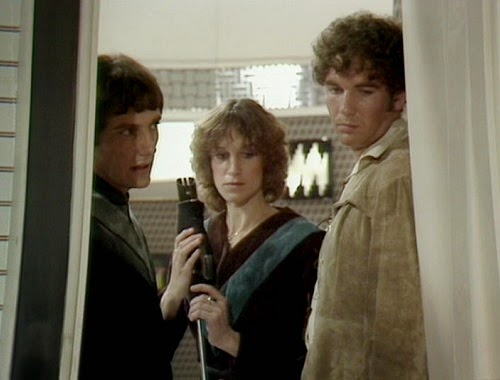Sarcophagus, like the previous episode Rumours of Death, is a great Blakes 7 story that I have reviewed before, and that has one key scene that the entire plot and raisin d'etre revolves around.
The alien that has made itself a body that looks like Cally except with gold skin and red hair (giving Jan Chappell a much, much better opportunity to play two roles than she had in Children of Auron - in fact I would say that this is Jan Chappell's best episode) has taken over the Liberator and has the crew at her mercy.
Except for Avon.
Again, the power of the (Tanith Lee-written) dialogue speaks for itself.
Alien Cally: "Avon."
Avon: "You are taking this ship precisely nowhere."
Alien Cally: "Don't be foolish. You spoil yourself. But I'll be patient with you. I've waited centuries. I can afford a few moments until you can bring yourself to consent to be obliging."
Avon: "And no one aboard this ship is going to accept or carry out a single demand of yours."
Alien Cally: "You've seen what I can do."
Avon: "It would be a little difficult to miss."
Alien Cally: "Don't try to play games with me."
Avon: "Nothing was further from my mind. You've given us your terms, now I will give you ours."
"No deal."
Alien Cally: "I thought you were the clever one. You're a fool, like Tarrant. The pain Tarrant is experiencing - visualise that pain and much more. You're as close to death as you have ever been. Think about human death, Avon. Irrevocable."
Avon: "I have thought about it. What's keeping you?"
Alien Cally: "What did you say?"
Avon: "You claim you can kill me. You'd better get on with it.
Make me die. There's nothing else you can make me do."
Avon has learned a trick from his best friend Captain Kirk and is staring down the godlike-alien-of-the-week.
Alien Cally: "One last chance."
Avon: "Save it."
The alien Cally can't kill Avon because the real Cally is fighting it.
Avon: "It seems you made another mistake. Cally has loyalties after all. But you knew that right from the beginning, didn't you?"
"You look so beautiful when you're angry."
And then...
Avon kiffs alien Cally, and because he's Avon it is the kiff of death. While he is kiffing her he steals her ring of power.
Avon: "Thank you."
Alien Cally: "Give it to me."
Avon: "That would be a little foolish, when I just went to so much trouble to get it."
Alien Cally: "You don't understand."
Avon: "Don't I? Psychic abilities boosted by high technology. This ring is the real source of your power, isn't it? This is how you formed your link with Cally and you cannot hold her or feed off this ship without it."
Alien Cally then pleads for her life in a speech that is pure Tanith Lee (I am a big, gay long fan of hers, if you had not guessed).
"Avon! Avon, give it back to me. You must. You don't know. I have to keep this body. I have to live. I've waited so long. Centuries. More time than you could comprehend. How can you imagine what it must be like to be dead, to exist in nothingness, in nowhere. Blind, deaf, dumb, and yet to be sentient, aware, waiting. Centuries of waiting. I have to find my world again, my people, my home. I want to breathe and see and feel. And know. Don't send me back into the dark, Avon, let me live.
I want to live, to live. I want to live, to live, to live. I want to live, to live, to live. I want to..."
But Avon has already given her the kiff of death. Just to make sure he throws the ring away, where it lands in an exploding
Symbolically, Avon is Death, inexorable and without mercy. This is the new, post-Rumours of Death Avon.
Sarcophagus is not just a great episode in its own right, but coming after Children of Auron and Rumours of Death it is superbly placed in season 3 to move the characters of Avon and Cally (and, to a lesser extent, the others on the Liberator) forwards from those events and show - or perhaps just hinting at - how they have been changed by them.
With no characters other than the regular characters (excluding the very first scene of the silver aliens, and counting alien Cally as Cally), in isolation this story could be seen as padded - in modern day TV terms it is a Bottle Episode, which are supposed to be cheap although I don't know how that works with Blakes 7 given how cheaply it was made anyway - but I think that the story gives room for the actors and characters to develop in a way that no other episode of the series does.
It also has an excuse for Avon and Cally to kiff!
I think that is the real purpose of Sarcophagus. and I think it is a little sad that Tanith Lee never got to write an episode for Avon and Tarrant together.
Oh well, that is what the internets are for...




























































